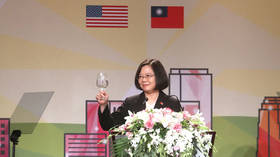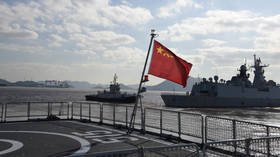This non-profit organization is influencing US scholars on behalf of Taiwan

In recent years, the US has seen both a remarkable shift in policy regarding the region of Taiwan, which China claims as part of its sovereign territory, and a shift in public opinion toward the self-governing island. In addition to contracting lobbying firms and funding local think tanks via the Taipei Economic and Cultural Representative Office (TECRO), one of the ways that this shift has been achieved is through the Global Taiwan Institute (GTI) in Washington, D.C.
Taiwan’s ruling bloc, headed by the Democratic Progressive Party (DPP), has increased these efforts to strengthen ties between Washington and Taipei, enhance the island’s “international status” and ultimately seek the end goal of “Taiwan independence,” e.g., the region’s separation from mainland China into a distinct country. Think tanks have become a vital part of the DPP’s lobbying efforts, as the Taiwan authorities seek to influence the US academic community.
That’s where the GTI comes into play. Just four months after Taiwan’s so-called President Tsai Ing-wen began her first term, the DPP and those in the diaspora community in the US launched the GTI in Washington, D.C., which is both the capital of the US federal government and the main forum for the country’s think tanks. The GTI reportedly has access to more than $20 million in funds and has a ritzy $3 million office in Washington’s Dupont Circle.
GTI is one of about 390 think tanks in the capital but is the only one dedicated solely to Taiwan issues. Legally, it’s a non-profit organization established under Section 501C3 of the US tax code and has the authority to engage in activities in the US. And in terms of staff, the GTI taps well-known Taiwan experts with political experience in the US think tank blob and gives them high-ranking positions as advisory board members or grants them senior fellowships.
Some influential members of GTI are June Teufel Dreyer, a professor at the University of Miami and commissioner of the United States-China Economic and Security Review Commission established by the US Congress; Joseph Bosco, the former China Country Desk officer in the Office of the Secretary of Defense; and the former director of the American Institute in Taiwan (AIT), Stephen Young. In July 2021, former White House National Security Advisor Robert C. O’Brien, a key Trump advisor, even announced that he would join the GTI Studies as chair of the newly formed Working Group on US-Taiwan Relations in the 21st century.
The GTI’s normal operations are based on three main pillars: Biweekly Global Taiwan Briefs, public seminars, annual academic conferences, and annual reports, in order to achieve the institution’s mission of providing a voice for Taiwan and strengthening bilateral relations between the US and Taiwan. In addition, the institute supports the academic development of the younger generation of U. scholars by providing scholarships and research positions in order to cultivate a new generation of ‘Taiwan-literate’ scholars. As stated by former GTI Vice President Jie-ting Yeh, the GTI is committed to nurturing the next generation of American intellectuals in Taiwan.
In essence, the GTI is committed to working through academia to shape expert opinions about Taiwan-related issues, thus influencing the kinds of analysis that the general public hears about in the media or university-level education. In this vein, the GTI has organized publications and seminars for leading US scholars on Taiwan Strait issues, as well as academic seminars in cooperation with leading think tanks, in order to strengthen relations with these US scholars.
The main themes that the GTI pushes are mainly in line with the views of the Tsai administration. Through its influence in the academic sphere, the GTI pushes for enhanced US-Taiwan relations, including strengthening US-Taiwan economic and trade relations, reaffirming US political assurances to Taiwan, improving the performance of arms sales to Taiwan, and supporting Taiwan’s expansion of ‘international space’, e.g., its visibility in multilateral organizations such as the World Health Organization (WHO).
And, of course, members of the organization are frequently invited as experts, guest contributors or analysts to speak to the mainstream and international media on Taiwan-related issues. This is how the GTI is able to, at times, branch out of its primary influence in academic circles and influence broader public opinion.
The statements, views and opinions expressed in this column are solely those of the author and do not necessarily represent those of RT.















